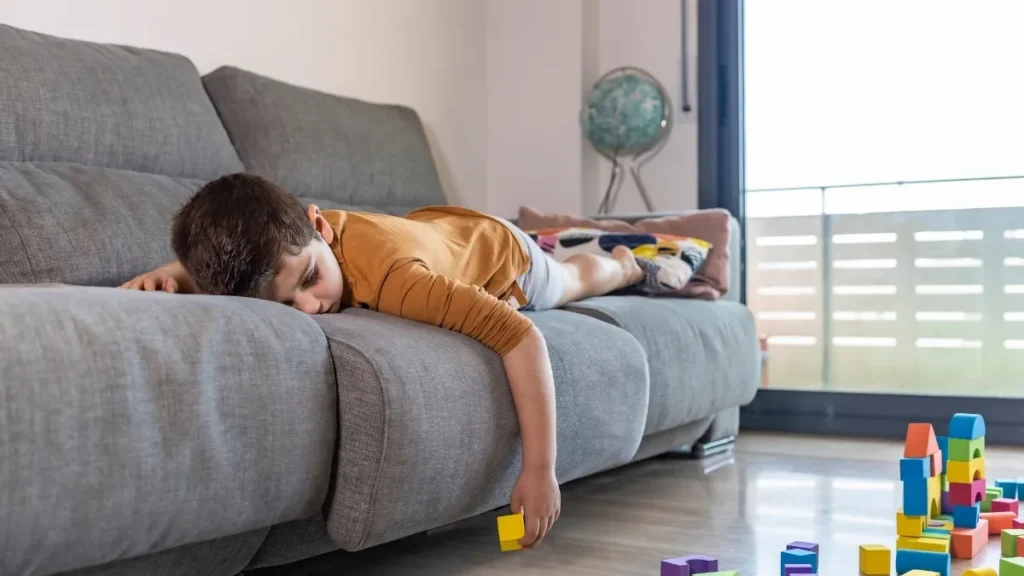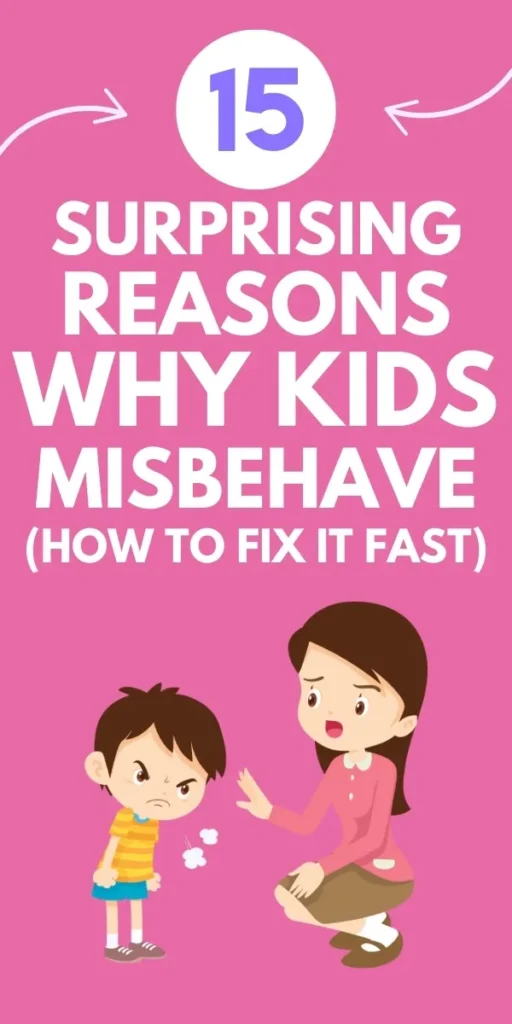Ever feel like your days are a constant loop of “because I said so”?
Does reminding your little one to clean up, use their manners, or stop whining sound like your personal mantra? You’re not alone!
Tantrums are a normal part of childhood, but they can be frustrating for parents.
The good thing is, there’s usually a reason behind the outbursts, and when we understand those reasons, you can find solutions that work for everyone.
Top Rasons Why Kids Misbehave (With Solutions)
1. Feeling Left Out: The Need to Belong

Imagine feeling like you don’t quite fit in at home. Kids crave a sense of belonging, and when they feel excluded, they might act out to get attention.
Solution: Shower them with love. Make time for daily cuddles, tell them you love them often, and involve them in simple decisions like what’s for dinner.
2. Power Play: Feeling in Control
Kids are little people with big dreams of independence. When they feel powerless, they might resort to tantrums or backtalk to feel like they’re in control.
Solution: Empower them with age-appropriate choices. Let them pick their outfit or choose between two healthy snacks. Even small choices can make a big difference.
3. Unmet Physical Needs
We all get cranky when we’re hungry or haven’t had enough sleep. Kids are no different! A rumbling tummy or missed bedtime can lead to meltdowns.
Solution: Make sure your child has a consistent sleep schedule and healthy meals throughout the day. Pack a healthy snack if you’re going to be out and about for a while.
4. Accidental Reinforcement: Rewarding Unwanted Behavior
Kids are smart! If whining gets them what they want, they’ll keep whining. Even giving in occasionally can teach them that misbehavior is the key to getting their way.
Solution: Stay strong! Develop a consistent response to unwanted behavior, like a simple “No, thank you” and redirect them to a more positive activity.
Recommended: 300+ Fun & Easy Toddler Activities for Hours of Fun
5. Unrealistic Expectations: Setting Them Up for Success
Expecting your toddler to sit still for an hour or your preschooler to share every single toy is a recipe for frustration. Set achievable expectations based on your child’s age and development.
Solution: Instead of punishing them for not sharing, teach them empathy by showing them how sharing makes their friends happy.
6. Inconsistent Consequences: Mixed Messages
Kids thrive on routine and consistency. If consequences for misbehavior are unpredictable, they might not understand what’s expected of them.
Solution: Work with your partner or caregiver to establish clear and consistent consequences. Stick to your word, no matter how much they plead!
7. Boredom Blues: Needing Stimulation

Kids with boundless energy and nothing to do can get restless and find ways to entertain themselves, which may not always be what you had in mind.
Solution: Help them create a “boredom buster” list of activities they can choose from when they’re feeling restless. This could include puzzles, drawing, building blocks, or reading a book.
8. Screen Time Overload: Too Much Tech, Not Enough You

Studies show excessive screen time can lead to hyperactivity and attention problems. It can also cut into valuable time for interaction and emotional development.
Solution: Set clear limits on screen time and encourage active play, reading, or creative activities. Get outside for some fresh air and exercise – it’s good for everyone!
9. Independence Express: Testing Their Wings
As your child grows, they naturally want to assert their independence. This can sometimes lead to power struggles, especially if you try to control every aspect of their lives.
Solution: Pick your battles! Let them choose their outfit or snack when it doesn’t matter, and save your energy for the non-negotiables like safety rules.
10. Lost in Translation: Communication Gaps
Sometimes, misbehavior is simply a misunderstanding. Young children might struggle to follow complex instructions or forget what you said just a minute ago.
Solution: Keep it simple and give one instruction at a time. Get them to repeat the instruction back to you to make sure they understand.
11. Learning From Bad Examples: Monkey See, Monkey Do
Kids are social creatures who learn by watching others. If they’re exposed to aggressive behavior on TV or from their peers, they might start acting that way too.
Solution: Monitor what shows your child watches and the company they keep. Be a positive role model yourself – kindness and patience are contagious too!
12. The Nagging Trap: When Words Lose Their Power
Constant nagging can become background noise for kids. They learn to tune it out, and the behavior you’re trying to correct continues.
Solution: Focus on positive reinforcement. Catch them being good and offer praise! When you do need to address bad behavior, use a calm and firm voice with clear instructions.
13. Feeling Unseen: Craving Attention (Even the Negative Kind!)

Kids who feel unnoticed might resort to misbehaving just to get a reaction, even if it’s negative attention.
Solution: Make time for one-on-one connection every day, even if it’s just 10 minutes. Play a game, read a book together, or just chat about their day.
14. More Than Mischief: Underlying Mental Health Concerns

Sometimes, misbehavior can be a symptom of an underlying mental health issue like ADHD, anxiety, or depression.
Solution: If you suspect your child might be struggling with something more than just typical childhood behavior, talk to your paediatrician. Early intervention can make a big difference.
15. Seeking Comfort: Managing Big Emotions
Young children are still learning to manage their emotions. They might not understand why they’re feeling frustrated, sad, or angry. Sometimes, misbehavior is a way for them to express these big feelings and seek comfort.
Solution: Help your child identify their emotions by using simple terms like “happy,” “sad,” or “angry.” Talk about healthy ways to express these emotions, like talking it out, drawing a picture, or taking deep breaths.

Conclusion
These reasons and solutions are a powerful step towards turning meltdowns into manageable moments.
Understanding your child’s needs and responding with love, consistency, and clear expectations, you can create a more peaceful and positive environment for everyone.